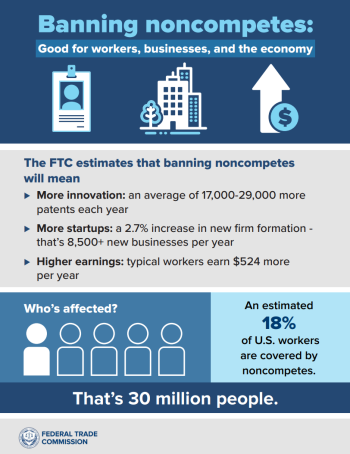
On April 23, 2024, the Federal Trade Commission issued a final rule banning virtually all noncompete agreements. It was scheduled to take effect 120 days after publication in the Federal Register, which pointed to an effective date sometime around the end of August. But before that happened, a Federal court struck down the rule, leaving the situation in a limbo.
What would the rule do?
As written, the rule would prohibit employers from enforcing noncompetes with workers other than senior executives as of the effective date. A “senior executive” is a worker in a “policy-making position” earning more than $151,164 per year. The FTC estimates that fewer than 1% of workers fall into this category. Further, the FTC emphasizes that even that exemption applies only to current noncompetes. Once the rule takes effect, companies cannot enter into new noncompetes with any employees, even senior executives.
The FTC said it would continue to allow noncompetes between the seller and buyer of a business. Also exempted are nonprofits, although some experts believe the ban would apply if an organization generates revenue for members of a for-profit entity. The final rule is over 500 pages, and even before the court rulling, lawyers were poring over the details while awaiting further guidance.There’s al
ready a lawsuit
The FTC has defended its decision, noting that “noncompetes restrict workers’ fundamental freedom to leave for a better job or to start their own business” and that they “prevent workers from starting their own firms and block new businesses from hiring qualified workers.” The FTC says that about one in five Americans, totaling nearly 30 million people, are subject to noncompetes.
However, not everyone agrees. The U.S. Chamber of Commerce had issued a statement saying, “The Federal Trade Commission’s decision to ban employer noncompete agreements across the economy is not only unlawful but also a blatant power grab that will undermine American businesses’ ability to remain competitive.” The organization said it was planning to sue the FTC.
So what’s next?
If you’re at a company that current has noncompete agreements or is considering them, contact a qualified expert to find out what the current situation is. For example, some experts believe state rules may replace the federal ruling. The smart thing is to avoid making any moves without guidance. The FTC is recommending the use of nondisclosure agreements, which it believes will be sufficient to protect proprietary information, and those may work for you.
Meanwhile, interested parties can read the FTC’s statement and download the fact sheet. Those with the patience to read it can also download the complete rule. The rule was intended to go into effect on September 4, 2024, but a federal court set it aside in August 2024.
We will follow up with additional guidance as it becomes available.









